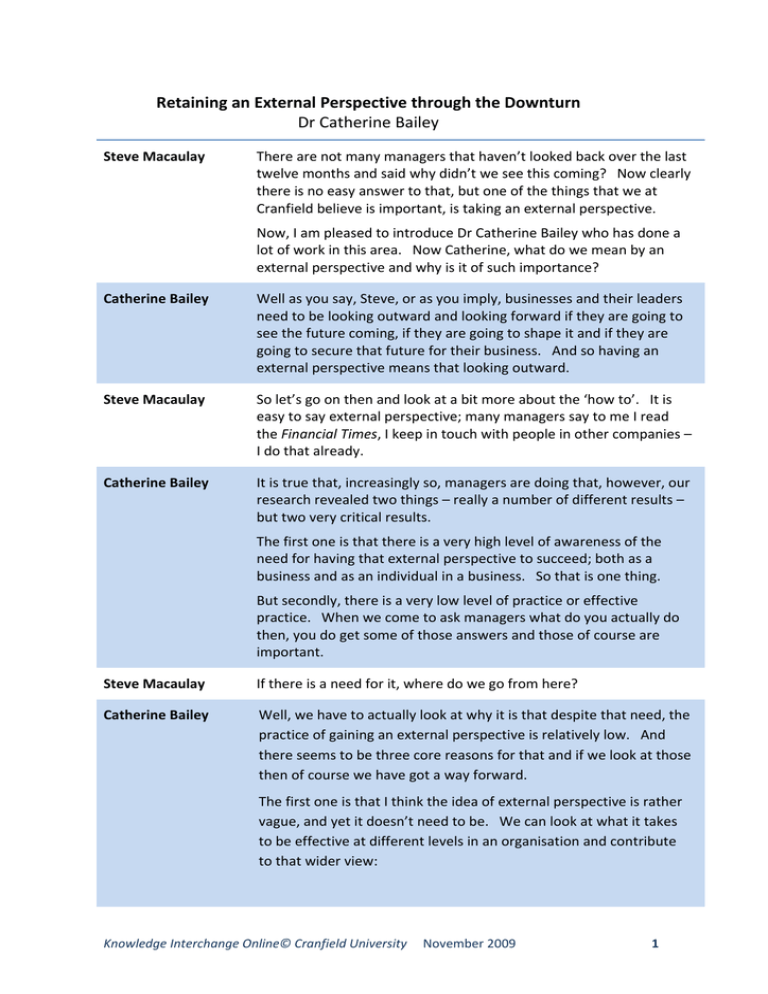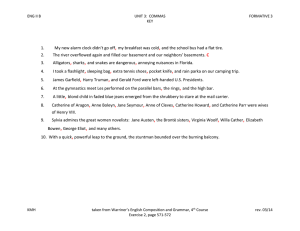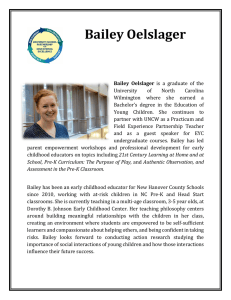Retaining an External Perspective through the Downturn Dr Catherine Bailey
advertisement

Retaining an External Perspective through the Downturn Dr Catherine Bailey Steve Macaulay There are not many managers that haven’t looked back over the last twelve months and said why didn’t we see this coming? Now clearly there is no easy answer to that, but one of the things that we at Cranfield believe is important, is taking an external perspective. Now, I am pleased to introduce Dr Catherine Bailey who has done a lot of work in this area. Now Catherine, what do we mean by an external perspective and why is it of such importance? Catherine Bailey Well as you say, Steve, or as you imply, businesses and their leaders need to be looking outward and looking forward if they are going to see the future coming, if they are going to shape it and if they are going to secure that future for their business. And so having an external perspective means that looking outward. Steve Macaulay So let’s go on then and look at a bit more about the ‘how to’. It is easy to say external perspective; many managers say to me I read the Financial Times, I keep in touch with people in other companies – I do that already. Catherine Bailey It is true that, increasingly so, managers are doing that, however, our research revealed two things – really a number of different results – but two very critical results. The first one is that there is a very high level of awareness of the need for having that external perspective to succeed; both as a business and as an individual in a business. So that is one thing. But secondly, there is a very low level of practice or effective practice. When we come to ask managers what do you actually do then, you do get some of those answers and those of course are important. Steve Macaulay If there is a need for it, where do we go from here? Catherine Bailey Well, we have to actually look at why it is that despite that need, the practice of gaining an external perspective is relatively low. And there seems to be three core reasons for that and if we look at those then of course we have got a way forward. The first one is that I think the idea of external perspective is rather vague, and yet it doesn’t need to be. We can look at what it takes to be effective at different levels in an organisation and contribute to that wider view: Knowledge Interchange Online© Cranfield University November 2009 1 Dr Catherine Bailey At a functional level you can contribute much more effectively to the organisation if you build a business perspective; if you have that wider business view, your decisions become more aligned. You are seeing what is coming more effectively. If you are working at a business level, as a senior manager, then of course you can perform that function so much more effectively if you have an industry view, if you understand what is happening in the industry and where your business is positioned. You can contribute much more effectively to the strategic agenda and to how the business operates. If you are at a business leader level, then of course you have got to be looking much further out. The external perspective you need is outside your industry; of course you have to understand your industry, that is taken for granted, but it is looking outside. Where is the future of your industry coming from and how can you be at that future first? You won’t see that unless you are systematically exposing yourself to, and understanding trends that are shaping the models that are going on in other industries. So real clarity about what is the best opportunity for you is important. Second, barriers; if we don’t really understand how to do that really well. And there are six obvious ways of building external perspective; each one of them can be used at whatever level we are talking about. Simply reading or researching yourself, investigating that competitor or that industry clearly; benchmarking; attending events whether it is within your industry, outside your industry or within your business. Simply putting yourself into a position where you come in contact with people; an open programme, for example, using development events as a way of building that perspective. And of course networking, both in your business, in your industry and externally. You can’t do it all; which is the most effective one for you? The third barrier that stops people and businesses building external perspective is that businesses aren’t actually favourable to that; the conditions aren’t favourable at the moment. Short term focus, operational delivery focus is not conducive to people looking wider. Development programmes don’t seem to be working in that way in businesses at the moment; portfolios are being cut, they are focusing very much on here and now problems and issues – vey © Cranfield University November 2009 2 Dr Catherine Bailey understandable, very necessary, but where is the balance that is enabling people to look forward and look into the future, get that wider perspective? And finally, as business leaders naturally enough we are concerned about the profit that this quarter has returned, but are we doing things now and are we encouraging other people to do things now which help us see the future coming next year and the year after? That is absolutely critical. Steve Macaulay So what key message would you like to leave managers, organisations, maybe people that help organisations improve? Catherine Bailey Well, very clearly as a manager, every manager should be creating their own personal agenda; what do I need to know more about next to move my boundary, my view, my horizon out a little bit further? Using everyday activity, not waiting for special events, using the everyday activity to build that. If you know what is on your agenda – I need to know more about this part of the industry – that conversation with a customer is an opportunity to just understand a bit about the industry from their perspective, for example. Not only having the personal agenda, building it in every day, but then being quite selective about the development opportunities you get. What is this going to enable me to do? Who will this put me in contact with? Will I be networking with at the right level to build the perspective that I know that I need to be building next? If you are a business leader, where is it on the executive agenda? What are you doing yourself? Where is the time in your diary for that future thinking, or for asking other people what is happening in the industry or what is best practice in that part of the business worldwide? That sets off their external perspective too. And if you are in a position where you are helping businesses to develop I think you just need to be reviewing what is the portfolio of activities that we are building here? Is it balanced in terms of the here and now and the future? And is it developing the skills that managers need to not only seek that wider perspective, but also use it really well. Steve Macaulay Some important points to consider there. Thank you very much. Catherine Bailey Thank you. © Cranfield University November 2009 3



